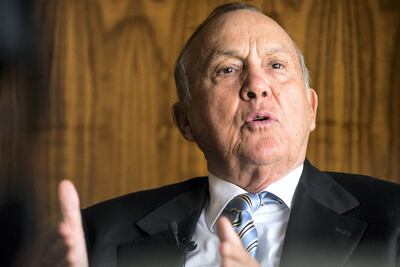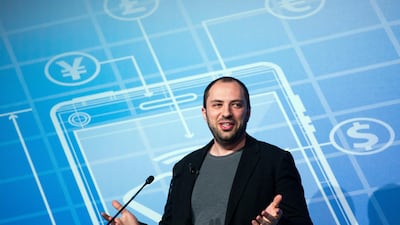Jan Koum
Jan Koum’s exit from Facebook could cost him as much as $1 billion.
The chief executive of messaging unit WhatsApp confirmed in a Facebook post last Monday that he is leaving the company. The announcement precedes the final three vesting dates of restricted stock awards tied to Facebook’s $22bn purchase of WhatsApp in 2014.
"It is time for me to move on," Mr Koum, 42, said in the post. "I’m taking some time off to do things I enjoy outside of technology, such as collecting rare air-cooled Porsches, working on my cars and playing ultimate Frisbee.”
Mr Koum got about 24.9 million restricted shares as part of the deal, most of which has already vested. Of those remaining, 1.9 million are due to vest in mid-May and mid-August, respectively, plus a final tranche of 2.1 million in November.
The awards are contingent on him being employed through those dates. He would forfeit 5.8 million shares - worth $997.5 million as of Monday’s close - if he leaves before May 15, unless his exit is categorised as an involuntary termination or resignation for good reason, regulatory filings show.
The precise circumstances of his departure are not clear. Mr Koum will not stand for re-election to the board at Facebook’s May 31 annual meeting, the company said in a filing. A spokeswoman for the Menlo Park, California-based firm declined to say when Mr Koum’s departure takes effect.
Mr Koum clashed with other executives over strategy, the Washington Post reported last week. Brian Acton, who co-founded WhatsApp with him, announced his departure from Facebook last year. In March, Mr Acton posted the #DeleteFacebook hashtag amid outrage over the social network's data-privacy lapses.
Even if he leaves some money on the table, Mr Koum has still amassed a $10.4bn fortune, having sold $8bn of Facebook stock since 2015, according to the Bloomberg Billionaires Index, a ranking of the world’s 500 richest people. He is No. 136 on the list.

Cho Hyun-min
The stony-faced daughter of a Korean billionaire, whose older sister was brought low by the "nut rage" scandal, apologised last Tuesday as she reported to police for questioning over allegations she sprayed a business associate in the face with fruit juice.
"I'm really sorry for causing concern," Cho Hyun-min repeatedly told a crowd of journalists outside the Gangseo police station in Seoul, without admitting to any specific actions.
Ms Cho, who police said is accused of using violence and obstructing business, is the daughter of Hanjin Group chairman Cho Yang-ho.
Mr Hanjin is among the country's 15 biggest business groups, owner of flag carrier Korean Air, logistics and transport firms, and with interests in information technology and hotels.
It used to own Hanjin Shipping, once one of the world's biggest shipping firms, which was declared bankrupt last year.
The younger daughter's police interrogation is only the controlling family's latest brush with the law, with a series of scandals making them some of the country's most notorious super-wealthy.
South Korea's economy - the world's 11th-largest - is dominated by a series of giant business conglomerates known as chaebols.
In the past, the chaebols contributed to the country's fast economic growth, but as the founders' sons and grandsons took over they expanded into every corner of business, and now stand accused of suffocating smaller companies and hampering innovation.
Many chaebol families retain only a small ownership stake in their companies, but maintain control through complex webs of cross-shareholdings between subsidiaries, and rapid promotions for family members - some of whose antics have battered the firms' images.
"The Cho family is one of the most vilified chaebol families, with multiple family members implicated in alleged bad behaviour," said Chung Sun-sup of online information service chaebol.com
In the most infamous incident, the chairman's elder daughter Cho Hyun-ah made global headlines in 2014 for forcing two flight attendants to kneel and beg for forgiveness after she was served macadamia nuts in a bag rather than a bowl.
She ordered the Seoul-bound flight back to the gate so one of them could be ejected in an incident quickly dubbed "nut rage".

Shahid Khan
Wembley is one of London’s most iconic venues. The aspiring owner of the soccer stadium considers it “the cradle of English football.” Lawmakers agree it’s a sacred cow and they’re not sure it should be sold.
An influential parliamentary committee - the same one giving Facebook a hard time - is meeting Wednesday to decide whether to launch an investigation into Shahid Khan’s £600m ($817m) bid for the home of the English national soccer team and also the site for many a pop concert and sporting event.
The Pakistani-American billionaire is trying to buy Wembley from the Football Association, but his interest has run into all sorts of opposition about giving away the country’s crown jewels at a time when preserving brands in the age of Brexit has become politically key.
Unilever, for example, one of the UK’s best-known corporate giants and maker of Marmite, has picked Rotterdam over London for its new headquarters.
Damian Collins - the chairman of the Digital, Culture, Media and Sports committee - plans to discuss the sale with members at the meeting, according to a person familiar with the situation who declined to be named because the matter is private.
“Wembley is a national icon we need to keep for the people of this country," said Justin Madders, a lawmaker from the Labour opposition party, who is not on the committee.

Christo Wiese
The former chairman of scandal-hit South African retail giant Steinhoff said on Thursday he was suing the company for $4.8 billion, dealing a major blow to its efforts to survive.
Christo Wiese, a billionaire retail tycoon, is seeking to recover investments he made in Steinhoff in 2015 and 2016.
He was the biggest shareholder in the company when an accounting scandal erupted in December, since when its stock has crashed 95 per cent.
Its businesses include British high-street discounter Poundland, France's Ligue 1 sponsor Conforama and Pep Africa, which runs Africa's largest clothing factory.
"It is in the best interest of all stakeholders in Steinhoff that a restructuring of the group be effected on fair and equitable terms," Mr Wiese's investment company, Titan Group, said in a statement.
Chief executive Markus Jooste and Mr Wiese both resigned in the wake of the crisis, with the company under investigation in Germany over a reported $7bn hole in its accounts.
Steinhoff had been a darling of fund managers with its eclectic, sprawling, consumer-focused empire with outposts in 30 countries, but is now burdened by $12.7 billion in debt.
Mr Wiese told a South African parliamentary hearing in January that news of the accounting scandal was "a bolt from the blue".
His wealth has plunged from more than $5bn to $2.1bn, according to the Bloomberg Billionaires Index.
Ken Moelis
Few bank CEOs ever become billionaires. Jamie Dimon did. So did Lloyd Blankfein.
And then there’s Ken Moelis, a power dealmaker few people outside Wall Street have probably heard of.
Since taking his boutique investment bank public four years ago, Mr Moelis, 59, retains a 10 per cent stake and has a net worth normally reserved for chieftains of hedge funds or private equity giants. He’s now a billionaire, even though his firm is one-hundredth the size of Dimon’s JPMorgan Chase, according to the Bloomberg Billionaires Index.
Perhaps no banker better encapsulates the rewards - and risks - of boutique firms quite like Mr Moelis, a devotee of arch capitalist Ayn Rand who got his start in the 1980s under Michael Milken. Since then he’s reeled in one high-profile client after another, from Ted Turner to Steve Wynn, and Carl Icahn to Donald Trump.
Yet his prowess underscores a fundamental question faced by many firms built around a rainmaking founder: Is Moelis & Co. more than Ken Moelis?
“That’s always the question with a boutique when the first generation is there,” said Blackstone Group’s Tony James, one of Mr Moelis’s bosses at Donaldson, Lufkin & Jenrette in the 1990s and now one of his biggest fans. “Who he hands the reins over to is a critical moment of risk.”
Mr James said Moelis & Co. is no longer reliant on its chief executive. But there are plenty of worrying examples of boutique firms that flamed out after their founders left.
Mr Moelis, who declined to comment for this story, is planning for the long-term, saying in December that he would step down before he turns 65 to focus more on mergers and acquisitions. Co-presidents Navid Mahmoodzadegan and Jeff Raich, who helped found the firm with him, are seen as potential heirs. The pair own about $94m and $51m of company stock respectively, according to the company’s latest proxy filing.
Mr Moelis, however, who started his career on Wall Street by happenstance, remains the face of the firm and its central dealmaker. He often starts dialing the phone at 5am and will jet across the world to see a client at a moment’s notice. Friends say dinners are frequently interrupted by hours of work calls. One former colleague recalls Mr Moelis insisting on making an extra call at the end of each working day to generate hundreds of additional prospects a year.


